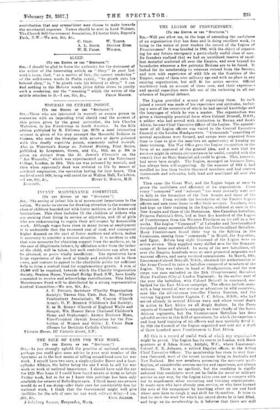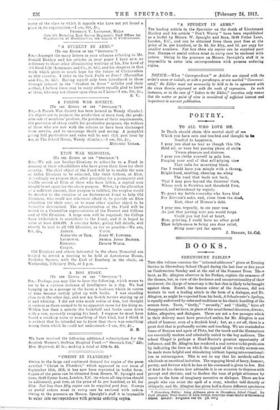THE LEGION OF FRONTIERSMEN.
[To rat EDITOR or TES "SPECTATOS:1 SIII,—Will you allow me, in the hope of extending the usefulness of an organization that has done and is doing excellent work, to bring to the notice of your readers the record of the Legion of Frontiersmen? It was founded in 1906, with the object of organiz- ing for any future emergency a particularly useful class of men. Its founders realized that we had an unutilized reserve of excel- lent material scattered all. over the Empire; and even beyond its boundaries wherever a few patriotic Britons are to be found. It looked for its membership to veterans retired from the Service, and men with experience of wild life on the frontiers of the Empire, many of them over military age and with no place in any existing organization, but still fit for active service. Official machinery took no account of these men, and their experience and special- capacities- were left out of the reckoning in all our schemes of Imperial defence.
The Legion provided a means of organizing them. As each joined a record was made of his experience and aptitudes, includ- ing a note of the countries of which he had special knowledge and the languages of which he was a master. The organization was given a thoroughly practical form when Colonel Driscoll, D.8.0., a soldier who had served with distinction in Burma and South Africa, became Chief Executive Officer of the Legion. The appoint- ment of all Legion officers was vested in the Central Executive Council at the London Headquarters. " Commands " consisting of several squadrons were formed, and camps were organized from time to time to give the members an opportunity of keeping up their training. The War Office gave the Legion recognition in the form of an approval of the general idea, and a note that He services might in certain circumstances be useful, coupled with the remark that no State financial aid could be given. This, however, had never been sought. The Legion, managed on business lines, has always been self-supporting. By the summer of 1911 it had enrolled no less than twelve thousand members and had centres (commands and sub-unite, both land and maritime) all over the earth.
Then came the Great War, and the Legion began at once to prove the usefulness and efficiency of its organization. From every " command " and " sub-unit " the word instantly went out to help in the formation of the New Armies and those of i Dominions. From outside the boundaries of the Empire Legien officers and men came home to offer their services. Numbers, wlm had kept up their training in the Legion, enlisted at once in the New Armies and those of the Dominions. One Canadian battalion. Princess Patricia's Own, had at least five hundred of the Legion of Frontiersmen from the Western Provinces. ou its roll in a few weeks. The Legion " Command " of Labrador and Newfoundland furnished many seasoned soldiers for the Newfoundland Battalion. Many Frontiersmen found their way to the fighting in the Cameroons, coming from " commands " in Brazil, the Argentine, and Egypt. Before long eight thousand of the Legion were on active service. They supplied many skilled men for the Remount camps at home and abroad. In many of the new battalions, all over the Empire, hundreds were at once promoted sergeants awl warrant officers,-and many received commissions. In March, 1911. Lieutenant-Colonel Driscoll, ]I.S.O., obtained the authorization of the Army Council to raise a battalion composed of members of the Legion. This was taken in hand at Headquarters, and the new corps was soon embodied as the 25th (Frontiersmen) Battalion Royal Fusiliers (City of London Regiment). In the earlier part of the year the battalion, with Colonel Driscoll in command, em- barked for the East African campaign. The officers include many with a long record of war service or adventure in wild countries. men like the adventurous traveller Cherry Kearton, and the veteran big-game hunter Captain P. C. Scions, D.S.O., who hat served already in several African wars, and whose recent death in action in East Africa we all deeply deplore. In the Press reports of General Smuts's campaign we hear chiefly of the South African regiments, but the Frontiersmen Battalion has done splendid service in this field of operations, for which the experience and long hard training of it's officers and men specially fitted it. In 1916 the Council of the Legion organized and sent out a draft of three hundred more Frontiersmen to East Africa.
All this is a record of useful work of wliieh any organization might be proud. The Legion has its centre in London, with Head- quarters at 6 Adam Street, Adelphi, W.C., where Lieutenant- Colonel E. R. Johnson, a retired Regular officer, is the Acting Chief Executive Officer. The membership has risen to over four- teen thousand, most of the recent increase being in Australia and New Zealand. But new members possessing the necessary quali- fication, of considerable oversee service and experience, are always welcome. There is no age-limit, but the condition is rigidly enforced that candidates must not be liable for naval or military service in any way, for tire Legion takes care not to compote with but to supplement other recruiting and training organizations. It wants men who have already seen service, or who have learned the arts of the campaigner by knocking about on sea and land where men have to- rough it and shift for themselves. It tries to find for each the work for which his record shows he is best fitted. and large at its membership -is, it believes that there are ICU many of the class to which it appeals who have not yet found a place in its organization.—I am, Sir, &e.,
FREDERICK V. LONGST.AFF, Major
(late 5th Battalion East Surrey Regiment), Staff Oftleer for rz
O.mixation at Headquarters, the Legion of Frontiersmen.







































 Previous page
Previous page